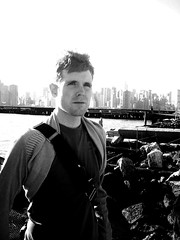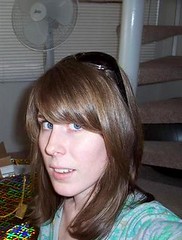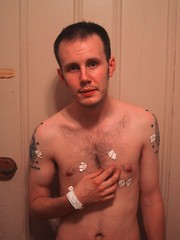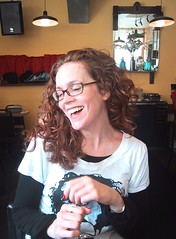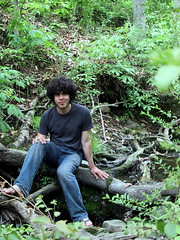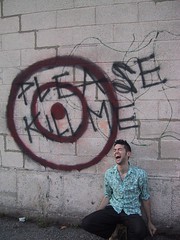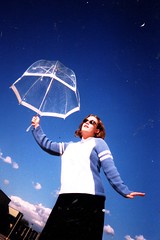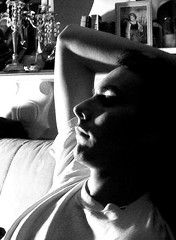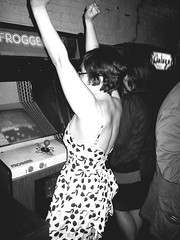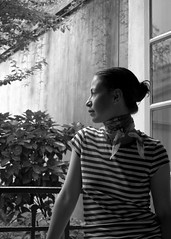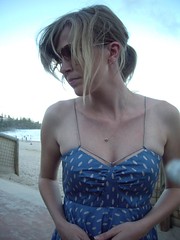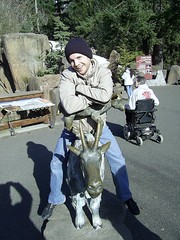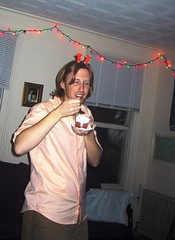
Mother bought a special foot for the sewing machine to tackle the thick double-knit material that she would expertly fashion into two tiny leisure suits just in time for Easter Holiday. We were a secular family and Brother and myself were just two of twenty-seven
first cousins and seventy-one second cousins, so childcare resources were always stretched thin. Into this vacuum, local churches had no trouble attracting a captive audience of pagan offspring to their educational offerings.
Father had met Reverend Pruitt in January, he was selling construction supplies and The Reverend was a contractor. In their first conversation The Reverend had offered to send the church bus through our neighborhood a mile away from his church to pick us up at seven AM on Sunday mornings. We did not ordinarily rise that early and my memory of the first class is similar to what Patty Hearst might have felt when the
We gathered around a felt bulletin board and a lady with bosoms the size of an ice chest told us Bible tales with paper dolls backed in adhesive. At the conclusion of each narrative I would stand and clap; this is what we did at daycare at the conclusion of play pretend, or “children’s theater” if you are a sophisticate. After the third story had drawn to a close, Mrs. Bosoms asked me why I was clapping. You are so good at this, I said. Why do you think it is good? she asked. Well, I could never make up such long stories and keep track of the dolls and… the faces of the children around me cast downward. I had said the wrong thing, again. These are not made-up stories, child. She leapt upon me, burying my face in suffocating cleavage. These are the stories of the Bible, child, stories of The Lord God Almighty Jesus Christ who died for you sins and will return at The Rapture. Take the lord into your heart, repent, and repent. She smelled nice.
A sound began to seep through the drainage holes in the cement block construction. Not singing, yelling, or talking, still it was a passionate human sound. That’s the tongues, someone said. I would not figure out the meaning of that short sentence for years but I slipped it into my vocabulary immediately. Grandmother offers you a mealy grocery store tomato, that’s the tongues I would say.
Between the classroom and the service that children attended, tongue-free, we would take a break and were invited to play on an acre of barren red clay. I would decline, my Mother may have been known across three generations as the stain master but I would never test her temper with the kind of damage these wildings wrought on their wardrobes.
It was on the field that I first noticed Steven. At eight, he was older and taller and his speech was slurred. His red crew cut and white skin were striking, movie star handsome and Star Trek guest alien all in one towering package. All attempts at conversation were rebuffed. My mother filled in the blanks. A part of Steven’s brain had been damaged during birth and he would always talk that way; be nice to him she said. I wanted to do more than be nice to him; I wanted to teach him to speak. I told Mother we had been instructed to wear old clothes to church and spent the next two months chasing Steven around the yard yelling at him to be still and sit. He would grunt over his shoulder at me and keep running; I must have frightened him.
By Easter I had given up on good works. Mother had finished the leisure suits. Mine was foam green and Brother’s was white, both had snap closures in the jackets she put in with a special spring-loaded tool that I wasn’t strong enough to use. Twice as many people came to church that day, which was tongue-free the whole way through. Everyone was in fancy clothes. My parents came for the first time and introduced me to many people whom I was not aware they already knew through work or school. There was an egg hunt on the field. Some teenage boys held up a clear plastic shell filled with name-brand candy bars. A duplicate shell had been hidden along with one hundred eggs. The child who found the candy-bars got to keep them, obviously. The child who found the most dyed eggs would win a fancy basket filled with still more bars.
After the big announcement the kids just milled about, not really seeing any place eggs could be hidden. It was hot, the metal clasp on my clip-on tie seemed to absorb the heat from my body and direct it back to my throat. At the edge of the field was a wooded lot and there was a discarded car hood that I had found while chasing Steven. I nonchalantly began snaking towards it, trying my best to look purposeless. When I had my hands on the rusty metal I looked up, satisfied to see that no one had followed me. I heaved and nothing happened. I heaved to exhaustion. A voice was closing in, Over here baby, over here! A teenage giantess with a newborn tucked under one arm pole-vaulted into the grass. With one hand she flipped the steel artifact towards me. I narrowly escaped being crushed. She lofted her prize. Looky looky what I got, e’rybody!
No one looked. While I had been struggling alone the other children had realized the ingenuity with which those teenage boys had hidden the one hundred eggs. They were under the clay. With fresh eyes you could see the divots quite easily. Fifty children rooted through the soil like truffle pigs slinging muck in every direction. People were running back and forth screaming full Christian names. It was an angry Easter. Mothers were screaming for those responsible, who took off on foot through the lot. Red dirt on savage faces met the slaps of home training. I ran around the building to our car to wait out the siege.
We switched Sunday schools the next week. We still saw Reverend Pruitt and occasionally his wife. They would come by the house to pick up a package of nails or get drafted to perform one of my Aunt’s second weddings. I ran into Steven a decade later when we were teenagers. I was exiting a movie theater and recognized the back of his head from years before on the field. Father had told me that he had learned to drive and was working bagging groceries. I called out to him and he turned around, saying Do I know you? I explained the connection and he looked worried. Don’t tell my Dad you saw me here, he said. It was difficult for him to speak and he was already making his way to his car, so I let him go. I was happy he had the independence of spirit to see Terminator Two if he wanted.
I moved to
Five years went by and my father called to say that Mr. and Mrs. Rev were in
After I had seated them at a table and been introduced to their pastor friend who had a congregation in










